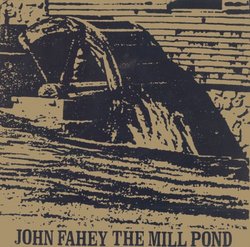Totally eerie...totally Fahey...
B. Bowman | Jersey, United States | 12/07/2008
(3 out of 5 stars)
"While I find it difficult to give a John Fahey release less than five stars, as I am a HUGE fan of his body of work, I can't justify five stars for this EP. There is more information on the recording of this release posted on Amazon than there is inside the CD, there are no liner notes and the personnel listed on the recording are Fahey on guitar and vocals, and Jeff Allman on electronics. This EP was recorded late in Fahey's life, I can only guess it was recorded sometime around the "City of Refuge" and "Red Cross" albums, which proved to be his last major releases before his death in 2001. Most are aware that during his "comeback" in the 1990's Fahey was deliberately distancing himself from his original audience who were fans of his fingerpicked acoustic guitar releases in the decades between the sixties and eighties, and was releasing albums full of harsh and grating music and was constantly trashing all his old albums in interviews. (I for one hated "City of Refuge" when I first heard it, kinda wish I still had my copy though as I'm thinking it deserves another listen.) This EP is no different, fans of Fahey's early albums be warned, you will not like this. There is very little acoustic guitar featured on this EP, it consists mainly of Fahey's experiments with drone singing and noise. "Ghosts" begins the disc, and features Fahey playing a single chord with a slide guitar (almost making it sound like a sitar) and actually singing. (A first for Fahey as far as I know.) There are no words, only haunting open throated notes at various heights and depths of his vocal range. The result is an eerie sounding raga of sorts. "Garbage" is a wash of sounds that most would probably hate: 10 and a half minutes of white noise that sounds like Sonic Youth thrown into the washing machine's spin cycle mixed with electronic effects. Definitely only for the open minded, and while it is hypnotic at times it is an experimental piece that I doubt the average listener would make it through. I can only equate it to Lou Reed's "Metal Machine Music"; if you can sit through that album and enjoy it you will love this. "You Can't Cool Off In The Mill Pond, You Can Only Die" is a terrifying mix of white noise, droning guitar chord strums, and Fahey's throat singing/screaming mixed with distortion. Truly unsettling, and knowing now that this was a man that was looking death in the face makes this three minute passage that much creepier. Fans of industrial music would probably love this one, but again, the average person will probably start praying within the first minute of hearing this. "The Mill Pond Drowns Hope" is the final song, and features some of Fahey's more traditional slide guitar playing with an added echo effect and more throat singing at the song's end. The package the disc comes in is pretty cool: a cardboard sleeve with an accompanying booklet containing two pages of Fahey's scribbles, and 29 of his paintings and collages, which are just as haunting as the music on the disc. Overall, if you are a Fahey completist like me I wouldn't say don't buy this, but I definitely would recommend buying it from an independent seller rather than paying full price. While it is a rare item and that may justify the price, you are getting less than 30 minutes of, well...I wouldn't say music, but less than 30 minutes of Fahey's experiments. And be warned: if you are a fan of Fahey's early albums, this is not for you. There is nothing remotely pleasant here. This is the darkest Fahey release I can think of, and I'm quite sure that was his point. In fact if I gave it one star and a horrible review I'm sure Fahey would be smiling proudly somewhere. While I can see the link between his work here and his early experiments with noises on "A Raga Called Pat" in the sixties, Fahey took that concept to an extreme late in his life. If you are a fan of Fahey's later work like "Womblife" or "City of Refuge" or are just curious, take a chance on this one but do so at your own risk."


 Track Listings (4) - Disc #1
Track Listings (4) - Disc #1